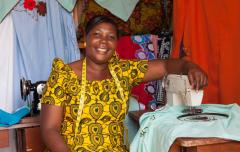Achieving inclusive energy at scale
Sustainable Energy for All (SEforALL) recently hosted a webinar with Practical Action, a People-Centered Accelerator partner, to discuss the latest Poor People’s Energy Outlook (PPEO 2018) report, Achieving inclusive energy access at scale.
The webinar can be viewed below.
The report explores how energy access can be accelerated to achieve both the scale required to meet global goals and the inclusivity needed to leave no one behind, in particular women and the poorest. The key question driving the report is whether scale and inclusivity are mutually exclusive or can energy access otherwise be scaled up and reach the “last mile” at the same time, said Lucy Stevens, Senior Energy Access Adviser at Practical Action.
Practical Action is a development charity that has been challenging the energy sector’s traditional focus on large-scale infrastructure projects for 50 years. It instead emphasizes energy services that matter most to people on the ground by giving voice to key stakeholders and communities.
“Our pace of change to achieve our 2030 goals is still too slow. The message we want to deliver is that it is possible to deliver scale while reaching the last mile. But no one has really cracked the challenge yet and we need changes in approaches,” Stevens said.
Practical Action examined national-scale programs in the clean cooking, off-grid electricity and grid-extension sectors across sub-Saharan Africa, South Asia and Latin America. It found that no program it examined had reached the twin goals of scale and inclusivity.
For instance, India’s program to extend electricity access between 2005 and 2015 was successful when it came to scale as a result of massive grid expansion to deliver energy. Taking Odisha State as an example, the program nearly doubled energy access from 43% of the population to 85%. But it fell far short of indicators measuring inclusion in terms of gender, off-grid systems and the consistent delivery of electricity, although it did help reach households below the poverty line. This was an example of driving scale at the expense of inclusion.
In contrast, a biogas stove program in Kenya over the last decade produced significant results in terms of gender benefits, but only reached 10% of the potential market due to challenges in gaining access to remote and poor communities.
Most of the programs examined emphasized supply rather than demand. Measures of program success should reflect not just numbers of connection, but aspects of remoteness, poverty and gender, said Stevens. “Reaching the last mile requires a concentrated focus.”
To address the competing goals between scale and inclusion requires a holistic approach and integrated planning to deliver a mix of programs involving gird, off-grid and clean cooking solutions.
Key aspects of inclusion should be baked into program implementation, from planning and design to delivery and evaluation, to recognize those who are at risk of being left behind.
Since planning for inclusivity is critical to achieving universal energy access, decentralizing key elements of decision-making to local levels can help achieve this goal. Better data sets are also needed to measure progress on both scale and inclusivity.
Several energy access stakeholders participated in the webinar to discuss their own experiences on how scale and inclusivity can be pursued in tandem. They included Leslie Labruto, Head of Global Energy, Acumen; Amber Bloomer, Grant and Partner Development Expert, Inyenyeri; and Daniel Busche, Managing Director, EnDev.
“There is a risk that the poor will get left beyond since investment goes to the most profitable ventures,” said Labruto from Acumen, which provides seed money to companies providing essential services to the poorest. Acumen, which a Energy Access Booster partner, focuses on discovering unproven business models that have the potential to grow. “We are willing to accept lower financial returns for outsized impacts,” she said.
Most of Acumen investment capital comes from philanthropic grants. Acumen has a investment horizon of 7-10 years instead of the normal 3-5 years for other venture capital firms. It has invested $22.5 million in off-grid energy companies since 2017, with the goal of reaching at least 60 million people in sub-Saharan Africa and South Asia by 2026. Its role as a catalyst fund to attract other investors has succeeded, with $216 million raised so far from other sources.
In terms of investment criteria, Acumen tries to determine whether target companies can gain customer traction in terms of growth and whether they are operating in underserved markets. “We focus on whether the customers are using the product and whether the company is reaching the poorest and those most in need,” said Labruto. “Are they providing first-time access and gender coverage? We have rejected projects where the poverty focus is not enough despite their good financial prospects.”
Addressing gender inequality is also important in boosting company bottom-lines since women have the most at stake and are the most effective agents in reaching the customer base and promoting projects. “The lesson is that entrepreneurs only succeed if they listen to customers,” said Labruto.
One success story has been Easy Solar in Sierra Leone whose customer base grew from 300 people to 10,000 in 18 months after Acumen invested in the company.
Inyenyeri, a Rwanda-based supplier of clean biomass cookstoves, emphasized the importance of market-based solutions in achieving inclusivity. It provides smokeless cook stoves for free to customers, who in return provide the firewood that is used to manufacture the pellets that fuel the cook stoves. The goal is to provide clean cooking to households that do not have the money to buy safe stoves. The fuel pellets are also a cheaper alternative to charcoal, which 90% of Rwanda’s population now use for cooking.
Bloomer said the program is focused on inclusivity since it benefits mostly women and the poorest households, while relying on feedback from them in designing the stoves. Inyenyeri’s business model also “can work on scale” if the Rwanda government and other investors get involved. “The more investment we receive, the more we can scale,” she said.
EnDev’s Busche said energy access initiatives must take a market approach if they are to reach scale. But to get these markets launched, public subsidies and incentive mechanisms are needed to attract investment. “Appetite is growing among potential investors in delivering energy access,” but the focus must be on making these markets attractive to investors. The success of these initiatives ultimately rests on a blending of public and private capital and the prospect that scale can be achieved.




